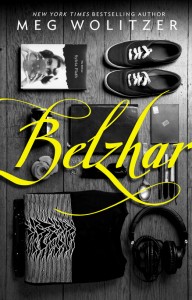 Belzhar, Meg Wolitzer
Belzhar, Meg WolitzerDutton, September 2014
Reviewed from ARC
There’s always some weird dance of anticipation and dread when an author you respect as an author for adult readers dips into the YA world. Happily, Meg Wolitzer is very clear eyed about YA and about why she writes YA — it’s not to jump on the glory train (and isn’t it funny that YA is the glory train? That never stops being strange to me), and it’s not to say something to teens, although of course things are said. No, it’s about the feelings, and about capturing them on the page so that the rest of us can revisit those heady emotions.
And Belzhar is a perfect tempest of teen emotion, even if it’s not always a perfect piece of writing.
Main character Jam is snarky and funny and maybe a little bit smug about how deeply she feels the loss of her boyfriend of 41 days, the too good to be believed Reeve (whom the reader will see is not actually all that great, but Jam is hormonal and adolescent and love is blind.) You get the sense that before Reeve Jam was a little boring and a little aware of it: “Mostly we were all considered cute-looking and nice and kind of shy”, as Jam explains, which makes it make sense that she’s reveling a little bit in her grief. Her immense emotional pain makes her special. There’s some tricky balancing going on — Jam is appealing even as she’s transparently kind of terrible, especially to her little brother. The fact that Wolitzer manages to keep Jam sympathetic, even on a second read, after we know the details of what happened with Reeve — it’s that slim thread of humor — says something about the strength of the voice.
More than that, this is a book that evokes emotional response by making metaphorical journeys literal, so that the reader can feel and grow alongside the characters. Belzhar, accessed through literally writing out emotional distress (not subtle, admittedly), is a place where loss can be faced and the importance of moving forward can become tangible; grief is hard to face, but when it’s a place it’s easier to see, for the reader and for the characters. And when that pivotal moment comes, over Thanksgiving (middle of the term, middle of the book, middle of Jam’s journey) — Jam helps deliver a baby goat, bringing life as she re-enters life — it’s impossible not to cheer for her, and for all of them as they move rapidly towards emotional healing, even if the metaphor is, again, lacking in subtlety.
Does it stand a chance? I’m guessing the odds aren’t great. Belzhar has voice and theme in spades, and some lovely literary shoutouts to Plath, whose Bell Jar and poetry become so meaningful for Jam and her classmates. It’s overtly a book about the power of books and friendship and great teaching, which will resonate with librarians and bookish teens alike. But did I mention it’s not subtle? The LA Times review accused it of afterschool special territory, and while I don’t think that’s fair, this is a book about bibliotherapy that will probably shine most when it’s used in a similar way, matched to the right reader at the right moment, unleashing or revisiting feelings that need to be let out.
RELATED
ALREADY A SUBSCRIBER? LOG IN
We are currently offering this content for free. Sign up now to activate your personal profile, where you can save articles for future viewing




Be the first reader to comment.
Comment Policy:
Comment should not be empty !!!